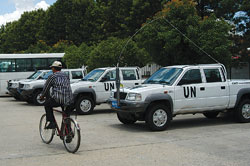|
|
Whenever UNMIN comes up in conversations these days, it is accompanied by derisive comments and gestures.
The mission's high visibility (the takeover of one of Kathmandu's grandest buildings for its office, its host of cars, jeeps, helicopters and planes that have become a constant feature of the Nepali landscape regardless of bandas or fuel shortages) contributes to the illusion that it was a force far more powerful than any indigenous political party or institution.
With such disjuncture between UNMIN's apparent virility and actual incapacity, it was inevitable that disillusionment would set in. Much of this, of course, is hardly UNMIN's fault, it is inherent in the very structure of UN missions and has been seen earlier in East Timor, Cambodia and elsewhere. With its abundance of resources but a mandate limited to the monitoring of arms and armies and the provision of 'support' to the constituent assembly election and peace process, the heightened expectations and disappointment could have been foreseen.
UNMIN adopts a very narrow interpretation of its mandate. It is true that its support for elections and Nepal's peace process is chiefly of a technical nature.
As it can only make political interventions in the capacity of mediator, it has to maintain strict neutrality. But neutrality does not mean there is a complete moral equivalence between all parties at all times.
There are occasions when one party is clearly more responsible than others for creating obstructions in the peace process, and it is UNMIN's responsibility to clearly state and put pressure on those who are particularly intransigent. Unfortunately, UNMIN is so cautious not to offend anyone that it has adopted a spurious definition of neutrality: one that apportions equal responsibility to all parties at all times, no matter what the circumstances.
When the Maoists decided not to participate in elections held according to a mixed electoral system and began pressing for the immediate declaration of a republic, it was UNMIN's responsibility to clearly state that this was a severe breach of prior commitments and should have brought pressure to bear. Instead, it remained silent on these crucial issues, stating merely that these were for the Nepali people to decide.
Throughout the past months, UNMIN has instead focused chiefly on the much less controversial issue of the government's refusal to implement the agreements it had signed with the Maoists in the past: regarding the future of Maoist combatants, living conditions in the cantonments and discussion on Security Sector Reform. The lack of progress on these issues, UNMIN's argument goes, led the Maoists to mistrust their coalition partners and then to quit government and refuse to participate in the scheduled elections. It is therefore the major parties in government, the NC in particular, that are responsible for the electoral delay.
Now that elections have been indefinitely postponed, UNMIN (and western nations and institutions that collectively call themselves the 'international community') hold that it is currently more important to deepen and strengthen the peace process and to 'create conditions for a credible election'-as if there is all the time in the world to create these conditions. As if it isn't of the utmost necessity to hold elections as soon as possible in order to ensure that elections do happen at all and forces against polls aren't allowed to disrupt the process.
Its excessive timidity in the face of a crisis is bound to further erode UNMIN's credibility in the eyes of the Nepali people and contribute to the impression that the Maoists can use it to further their own political ends. If it continues to interpret its already restricted mandate so narrowly, UNMIN will become increasingly irrelevant even if it stays beyond January.



